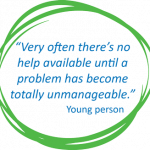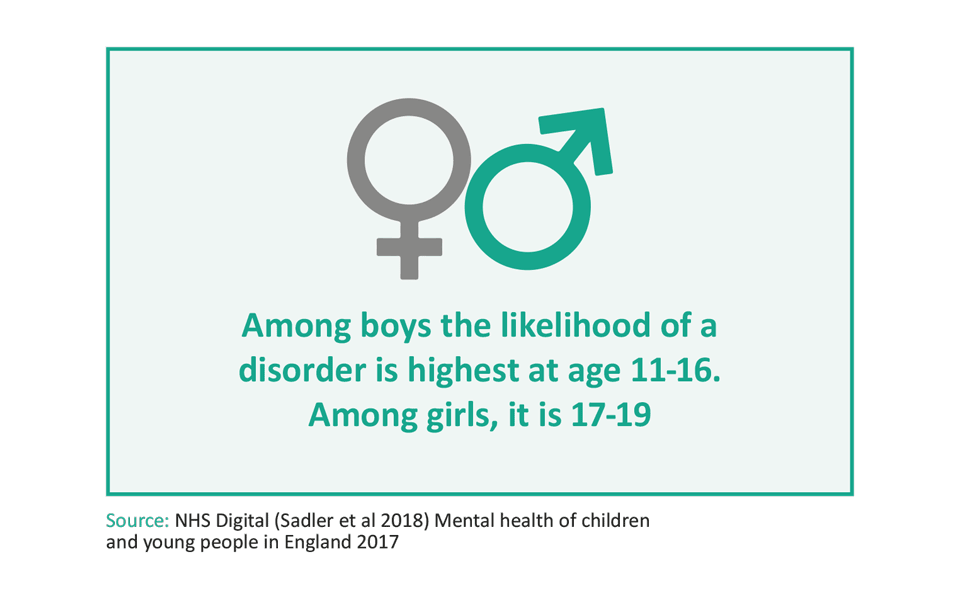The Government are developing a new ten-year strategy to improve the nation’s mental health and wellbeing. They recently ran a consultation with the public to inform what should be included in the plan. While the strategy will be applicable to all ages, it’s no surprise that our AYPH response focused on meeting the mental health needs of young people and preventing the onset of poor mental health outcomes before adulthood.
What is the level of mental health need among young people?
Happiness levels among children and young people have declined over time, with 7% of 10-15 year olds in the UK currently reporting to be unhappy with their lives. 14.4% of 11-16 year olds and 16.9% of 17-19 year olds meet the criteria for having a mental disorder. The peak onset of mental health conditions is 14.5 years. Suicide is the leading cause of death for young people. There are around one million children in England with ‘lower level’ and emerging mental health needs. There are worrying mental health inequalities for certain groups of young people. These statistics show the huge level of mental health need among young people in the UK today, which have been exacerbated by Covid-19.
Much of this can be prevented but current policy and practice is not able to keep up with rising levels of demand for mental health services and wellbeing support. CAMHS are overwhelmed and young people report increasingly lengthy waiting lists for services. Only a small proportion of young people are referred and accepted for treatment. Many young people have complained of the “one-size-fits-all” approach to mental health services, which do not cater for the wide range of need and may not be accessible to all young people.
“I wish they also knew how scary some people find it to go to the doctor and how much encouragement can be needed.” – Young person involved in AYPH work
What are the benefits of intervening and preventing poor mental health in adolescence?
Good mental health and wellbeing affects all areas of young people’s lives, including their ability to engage with education, their relationships with others and how they find their own way in the world. Building independence and a sense of self is important for having a positive wellbeing, which is particularly important for young people who are transitioning through key lifestages. The government’s mental health and wellbeing strategy must focus on prevention and early intervention in early adolescence.
Early support must be available across a range of settings. The preference of where to access support will vary from young person to young person. Wherever young people choose access support, they should be supported appropriately and effectively. Health services are often not youth friendly, there may be racial and cultural barriers that young people experience, and some young people may be unaware of how to access mental health support in the first place. These barriers must be overcome to ensure early access to mental health support among young people, particularly those experiencing inequalities.
“I had no idea I could go to my GP when I was struggling with my mental health.” – Young person involved in AYPH work
What are our recommendations for the new mental health and wellbeing plan?
- Develop a cross-government strategy to reduce health inequalities, to prioritise tackling the causes of poor mental health and inequalities.
- Increase investment in Local Authority budgets by restoring the public health grant in real-terms to 2015/16 levels, to enable local provision for local need, to foster collaboration between sectors and services and to ensure investment in youth services as safe spaces for young people.
- Adopt a community based approach for mental health and wellbeing support for young people by building upon existing support services (such as the Youth Access YIACS model) and funding co-designed drop-in support services (‘Fund the Hubs’).
- Deliver in full the commitments to improve young people’s mental health within the NHS Long Term Plan, including the continued roll out of mental health support teams in schools.
- Continue ring fenced investment in NHS mental health and support services, to ensure timely and accessible support (a “no wrong door” approach to CAMHS), tailored interventions for young people more likely to experience mental health inequalities and increased provision of social prescribing for children and young people.
- Increase provision of support for parents and carers of young people with mental health problems.
- Improve data collection and reporting of young people’s mental health and inequalities, including regular updates to the NHS Digital Mental health of children and young people survey.
- Underpin the mental health and wellbeing plan with adequate resources in order to implement the stated vision, with the trained workforce needed to implement the commitments.
 “Very often there’s no help available until the problem has become totally unmanageable. There isn’t help for me to be able to manage things myself and stop health and mental health crises.” – Young person involved in AYPH work
“Very often there’s no help available until the problem has become totally unmanageable. There isn’t help for me to be able to manage things myself and stop health and mental health crises.” – Young person involved in AYPH work
You can download our consultation responses in full on our policy consultations page.
Rachael McKeown – Inequalities Policy Fellow.

